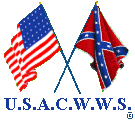
|
OTHER WAR BOOKS
------
CAMPAIGNS & BATTLES
|

|
|
I have "
star
" rated each book using the following scale:
 - Great! Run out and buy it!
- Great! Run out and buy it!
 - Good! Recommended!
- Good! Recommended!
 - Flawed! Some redeeming features. Get it from the library.
- Flawed! Some redeeming features. Get it from the library.
 - Gawd-awful! Avoid this one!
- Gawd-awful! Avoid this one!
 - Don't Ask!
- Don't Ask!
 - Not Rated!
- Not Rated!
These are, of course, only our opinions. Your comments or
rebuttals to the
Webmaster
are always welcome.
|
|
| |
 The Revolutionary War Memoirs of General Henry Lee
--- Edited by Robert E. Lee
The Revolutionary War Memoirs of General Henry Lee
--- Edited by Robert E. Lee
Probably one of the best books written about the Revolutionary War.
Light-Horse Harry Lee was every bit the "JEB Stuart" of his time. He
made a name for himself with "Lee's Legion" in battles at Haw River,
Guilford Courthouse, Eutaw Springs, and the seige of Yorktown.
Lee's Memoirs concentrate on the Southern war and therefor makes a
great companion book to the Northern War described so well in
"Saratoga" (See Below).
"Memoirs" as contrasted to the Civil War, illustrates how well an
out-numbered army can do when it has supplies, morale, and the time to
fight a defensive campaign. Of course, having the French on their side,
and British supply lines stretching across the Atlantic, didn't hurt
either.
Robert E. Lee edited this edition, after the Civil War, and added
numerous clarifying and/or correcting notes to his father's work.
However, it makes one wish that he had spent the time writing his own
memoirs, which would have been vastly more important than the
footnotes to his father's book.
I really enjoyed this book. It is well-written and brings the reader
into the Revoluntionary war as well as any of the Civil War books do
for that later engagement.
 Saratoga - Turning Point of America's Revolutionary War
--- By Richard M. Ketchum
Saratoga - Turning Point of America's Revolutionary War
--- By Richard M. Ketchum
What a great book! I lost a lot of sleep because I couldn't put it
down! At last, a writer who has thoroughly researched and brilliantly
presented a Revolutionary War campaign.
The campaign is, of course, Burgoyne's attempt in 1777 to conquer
the Hudson River and split the American colonies in half. Success by
him and his overwhelming army would all but assure a victory by the
British. The book details inter-personal relationships between the
various commanders (on both sides) using their correspondence and
those of their troops. It highlights the frictions that drove wedges
between the officers who were suppose to be fighting on the same side.
In some cases, these sour relationships directly impacted the war.
Ketchum, carefully and clearly, takes us down the Hudson as the
rag-tag American Army continually retreats and the British become
more confident. The savagery of the battles is not omitted, but it is not
used to sell the point that "war is hell".
We already know that. Especially brutal are the indians "allied" with
the British. They only stayed around as long as there were scalps and
booty to take. This was the first place that I learned that
the Mohawks were cannibals. From the book, page 266, "The very word
'Mohawk' came from the Algonquian root meaning man-eater or
cannibal..."
The circumstances and fortunes of war that led to the British
surrender are infinitely fascinating and doubly so when told by a
writer who knows how to write and has thoroughly researched his work.
|
|
 >
Civil War Books
> Other War Books
>
Civil War Books
> Other War Books
|
|



